-
REVIEW03-15-2024
Nursing care for parents who have experienced fetal demise: integrative review
Revista Brasileira de Enfermagem. 2024;77(1):e20220811
Abstract
REVIEWNursing care for parents who have experienced fetal demise: integrative review
Revista Brasileira de Enfermagem. 2024;77(1):e20220811
DOI 10.1590/0034-7167-2022-0811
Views0See moreABSTRACT
Objectives:
to identify scientific evidence regarding nursing care for parents who have experienced grief following fetal demise.
Methods:
an integrative review of original studies was conducted across six databases. The studies were classified according to the level of evidence.
Results:
the qualitative analysis of the nine studies comprising the sample involved thematic categories, exploring the impact of perinatal loss on families, inadequate communication by healthcare professionals, and the importance of a holistic approach in care. The role of the nurse is highlighted in making a positive contribution to the team, emphasizing participation in training and the provision of essential information.
Final Considerations:
grieving affects not only family dynamics but also the social environment, emphasizing the urgency of a more empathetic and comprehensive approach. Care should be holistic, going beyond technical nursing assistance, and addressing the biopsychosocial context of the parents.

-
ORIGINAL ARTICLE03-15-2024
Is there scientific relevance to the plot of films and documentaries about eating disorders?
Revista Brasileira de Enfermagem. 2024;77(1):e20220547
Abstract
ORIGINAL ARTICLEIs there scientific relevance to the plot of films and documentaries about eating disorders?
Revista Brasileira de Enfermagem. 2024;77(1):e20220547
DOI 10.1590/0034-7167-2022-0547
Views1See moreABSTRACT
Objectives:
to analyze films and documentaries about eating disorders from the last twenty years, identifying the way they approach the topic as well as their relevance for didactic use in teaching the health field.
Methods:
a descriptive study, whose data collection was carried out on the main streaming and video platforms, resulting in the survey of 60 media. Of these, only 25 had audio/subtitles in Portuguese (inclusion criteria). scientific relevance was analyzed considering psychopathological and epidemiological aspects of these disorders. A questionnaire about the plot, characters and descriptive data analysis were used.
Results:
most media were dramas about female teenagers who tried to conform to beauty stereotypes, whose symptoms portrayed converged with current medical diagnostic manuals.
Conclusions:
in practical terms, a classificatory list of 11 media was prepared that could be used as a teaching resource for teaching this topic in the health field.

-
ORIGINAL ARTICLE03-11-2024
Ethnically distinct populations and coping with violence against children in the COVID-19 pandemic
Revista Brasileira de Enfermagem. 2024;77:e20230350
Abstract
ORIGINAL ARTICLEEthnically distinct populations and coping with violence against children in the COVID-19 pandemic
Revista Brasileira de Enfermagem. 2024;77:e20230350
DOI 10.1590/0034-7167-2023-0350
Views0See moreABSTRACT
Objective:
To identify policies and programs adopted by a Brazilian municipality to address violence against children during the COVID-19 pandemic.
Method:
A qualitative documentary study. The study setting was the municipality of Ananindeua, Pará, Brazil. Data was collected from official websites between November 2021 and February 2022. Thematic content analysis was used with the support of webQDA software.
Results:
Three empirical categories emerged: a) Impacts of the COVID-19 pandemic on violence against children; b) Action strategies for tackling violence against children in the COVID-19 pandemic; c) Evaluation indicators and targets for action strategies for tackling violence against children.
Final considerations:
The documents revealed few direct mentions of children, especially traditional populations; they presented superficial and ineffective evaluations of the policies and programs adopted, using exclusively quantitative indicators.
-
ORIGINAL ARTICLE03-11-2024
Experiences of women with physical disabilities in labor and delivery assistance
Revista Brasileira de Enfermagem. 2024;77:e20230290
Abstract
ORIGINAL ARTICLEExperiences of women with physical disabilities in labor and delivery assistance
Revista Brasileira de Enfermagem. 2024;77:e20230290
DOI 10.1590/0034-7167-2023-0290
Views0See moreABSTRACT
Objective:
To understand the meaning attributed by women with physical disabilities to the health care received and expected during labor and delivery.
Methods:
Qualitative study, based on Social Network Theory, conducted through an online workshop in April 2022, with the participation of six women with physical disabilities. Data, collected through the focus group technique, underwent thematic content analysis with the assistance of the IRaMuTeQ tool.
Results:
Three thematic categories emerged: Challenges experienced during pregnancy; The experience within the maternity ward; and, The importance of social networks. The assistance provided by healthcare professionals sometimes differed between what was expected and what was received by women with physical disabilities during labor and delivery.
Final Considerations:
Experiences were predominantly negative, resulting from inappropriate professional conduct due to ableist attitudes. Support from members of social networks is crucial for preventing stressors.

-
ORIGINAL ARTICLE03-11-2024
Use of an application on the measles vaccine for Warao indigenous refugees in Brazil
Revista Brasileira de Enfermagem. 2024;77:e20230253
Abstract
ORIGINAL ARTICLEUse of an application on the measles vaccine for Warao indigenous refugees in Brazil
Revista Brasileira de Enfermagem. 2024;77:e20230253
DOI 10.1590/0034-7167-2023-0253
Views0See moreABSTRACT
Objective:
To evaluate the need to develop an application with information about the measles vaccine for Warao indigenous people.
Methods:
This was a quantitative study conducted at the Espaço de Acolhimento Tapanã refugee shelter in the city of Belém, Pará, Brazil. The study sample was selected for convenience. Data were analyzed descriptively using Bioestat 5.0 software.
Results:
Twenty-one Warao indigenous individuals were interviewed. It was identified that 91% (n=20) had lost their vaccination card; 91% (n=20) stated they had lost their vaccination card more than three times, and 91% expressed interest in an application to store their vaccination information.
Conclusions:
The research provided important information for the development of a health application named WaraoMedI (Warao Measles Diversity Indigenous), as well as offered nursing professionals evidence about the challenges Warao indigenous refugees face in self-managing their vaccination information.

-
REVIEW03-11-2024
Continuing nursing education actions in the face of homophobia: an integrative review
Revista Brasileira de Enfermagem. 2024;77:e20230094
Abstract
REVIEWContinuing nursing education actions in the face of homophobia: an integrative review
Revista Brasileira de Enfermagem. 2024;77:e20230094
DOI 10.1590/0034-7167-2023-0094
Views0See moreABSTRACT
Objectives:
to analyze continuing nursing education actions in the scientific literature in the face of homophobia.
Methods:
an integrative literature review with structured search in June 2022 in eight databases, using the descriptors Nursing Education, Homophobia, Sexual and Gender Minorities. Final sample consisted of six primary studies.
Results:
continuing nursing education actions are supported by strategies such as use of teaching materials, lectures, case studies and focus groups, addressing content such as gender identity issues and affective-sexual orientation, health disparities and their relationship with homophobia in healthcare settings.
Final considerations:
carried out in various healthcare settings, continuing education actions proved to be successful in raising nurses’ awareness in facing homophobia in health services, however, their expansion is necessary to create health spaces that meet the specific needs of these people.

-
03-11-2024
O uso da ultrassonografia point-of-care na prática clínica do enfermeiro como alicerce para a segurança do paciente
Revista Brasileira de Enfermagem. 2024;77:e77suppl0201
Abstract
O uso da ultrassonografia point-of-care na prática clínica do enfermeiro como alicerce para a segurança do paciente
Revista Brasileira de Enfermagem. 2024;77:e77suppl0201
DOI 10.1590/0034-7167.202477suppl0201pt
Views0Recentemente, mais um caso de dano grave associado ao cuidado em saúde foi reportado pela mídia. Uma jovem grávida teve a mão e o punho amputados depois de dar à luz ao terceiro filho em um hospital do Rio de Janeiro(). Após o incidente ocasionado pelo acesso vascular, a mulher apresentou hemorragia e foi reinternada.Os […]See more -
03-11-2024
The use of point-of-care ultrasound in nurses’ clinical practice as a foundation for patient safety
Revista Brasileira de Enfermagem. 2024;77:e77suppl0201
Abstract
The use of point-of-care ultrasound in nurses’ clinical practice as a foundation for patient safety
Revista Brasileira de Enfermagem. 2024;77:e77suppl0201
DOI 10.1590/0034-7167.202477suppl0201
Views0Recently, another case of serious harm associated with healthcare was reported by the media. A young pregnant woman had her hand and wrist amputated after giving birth to her third child in a hospital in Rio de Janeiro(). After the incident caused by vascular access, the woman suffered hemorrhage and was readmitted.The harm caused to […]See more
-
01-01-2016
Nurses’ performance on indigenous and African-Brazilian health care practices
Revista Brasileira de Enfermagem. 2016;69(5):840-846
Abstract
Nurses’ performance on indigenous and African-Brazilian health care practices
Revista Brasileira de Enfermagem. 2016;69(5):840-846
DOI 10.1590/0034-7167.2016690504
Views0See moreABSTRACT
Objective:
to analyze the performance of nurses from the Estratégia Saúde da Família (Family Health Strategy) on health care practices rooted in African and Indigenous cultures.
Methods:
Thematic Oral History was used and interviews were conducted with seven participants, who worked with Primary Health Care in Northeastern Brazil. The analysis was based on Leininger’s Theory of Cultural Care and the intercultural concept of human rights, among others.
Results:
nurses are unaware of the religious and historical context of the ethnic groups cared for and do not appreciate their self-care practices in areas with a predominance of African and indigenous cultures. These practices coexist with the hegemonic biomedical model.
Conclusion:
the debate on cultural competence in the context of professional qualification and exercise is required, aiming to promote the nursing work in the perspective of diversity and comprehensiveness of health care.
-
01-01-2016
Accessibility assessment of assistive technology for the hearing impaired
Revista Brasileira de Enfermagem. 2016;69(5):833-839
Abstract
Accessibility assessment of assistive technology for the hearing impaired
Revista Brasileira de Enfermagem. 2016;69(5):833-839
DOI 10.1590/0034-7167.2016690503
Views0See moreABSTRACT
Objective:
to assess the automatic accessibility of assistive technology in online courses for the hearing impaired.
Method:
evaluation study guided by the Assessment and Maintenance step proposed in the Model of Development of Digital Educational Material. The software Assessor and Simulator for the Accessibility of Sites (ASES) was used to analyze the online course “Education on Sexual and Reproductive Health: the use of condoms” according to the accessibility standards of national and international websites.
Results:
an error report generated by the program identified, in each didactic module, one error and two warnings related to two international principles and six warnings involved with six national recommendations. The warnings relevant to hearing-impaired people were corrected, and the course was considered accessible by automatic assessment.
Conclusion:
we concluded that the pages of the course were considered, by the software used, appropriate to the standards of web accessibility.
-
01-01-2016
Functional disability: health conditions and physical activity practice in older adults
Revista Brasileira de Enfermagem. 2016;69(5):825-832
Abstract
Functional disability: health conditions and physical activity practice in older adults
Revista Brasileira de Enfermagem. 2016;69(5):825-832
DOI 10.1590/0034-7167.2016690502
Views0See moreABSTRACT
Objective:
to verify the prevalence of functional disability among older adults and how it can affect their health conditions and the regular practice of physical activities.
Method:
this is a household and cross-sectional study conducted with older adults of both sexes. We verified the variables associated with functional disability by Poisson’s regression.
Results:
around 420 older adults participated in this study (68.1% of them being women). We observed a statistically significant association between functional disability, the number of chronic diseases, self-assessed health conditions, and the practice of physical activities; the latter only being found among men. Older adults who reported presenting four or more chronic diseases, self-assessed their health conditions as poor, and were not used to practice physical activities, showing high prevalence of functional disability.
Conclusion:
considering the changeable character of these variables, we recommend that prevention actions be taken, mainly at primary level, to delay the emergence of disability.
-
01-01-2016
Organizational culture of a psychiatric hospital and resilience of nursing workers
Revista Brasileira de Enfermagem. 2016;69(5):817-824
Abstract
Organizational culture of a psychiatric hospital and resilience of nursing workers
Revista Brasileira de Enfermagem. 2016;69(5):817-824
DOI 10.1590/0034-7167.2016690501
Views0See moreABSTRACT
Objective:
to analyze the organizational culture of a psychiatric hospital and identify the capacity of resilience of nursing workers.
Method:
quantitative research. For data collection, were used the Brazilian Instrument for Evaluation of Organizational Culture (IBACO – Instrumento Brasileiro para Avaliação da Cultura Organizacional) and the Resilience Scale (RS).
Results:
participants reported the existence of centralization of power and devaluation of workers, despite recognizing the existence of collaboration at work and practices for improving interpersonal relations. In relation to the capacity of resilience, 50% of workers showed high level, and 42.9% a medium level of resilience. The correlation tests revealed negative values between the IBACO and RS domains, indicating that the lower the appreciation of individuals in the institution, the greater their capacity of resilience.
Conclusion:
the organizational values reflect the work organization model in the institution that devalues the workers’ needs and requires greater capacity of resilience.
-
01-01-2016
Making our nursing research matter
Revista Brasileira de Enfermagem. 2016;69(5):813-814
Abstract
Making our nursing research matter
Revista Brasileira de Enfermagem. 2016;69(5):813-814
DOI 10.1590/0034-7167-2015-0156
Views0Nurses worldwide are being increasingly exposed to new and interesting research methodologies. At the same time, they are feeling considerable pressure to ensure that the studies they propose are sufficiently methodologically rigorous to pass the scrutiny of review for funding or publication. In this context, it is increasingly important to remind ourselves that methodological rigor […]See more -
01-01-2016
Fazendo nossa pesquisa em enfermagem ser relevante
Revista Brasileira de Enfermagem. 2016;69(5):813-814
Abstract
Fazendo nossa pesquisa em enfermagem ser relevante
Revista Brasileira de Enfermagem. 2016;69(5):813-814
DOI 10.1590/0034-7167-2015-0156
Views0Enfermeiros em todo o mundo estão cada vez mais expostos a metodologias de pesquisa novas e interessantes. Ao mesmo tempo, sentem uma pressão considerável para assegurar que os estudos a que se propõem são suficientemente rigorosos metodologicamente para passar pelo crivo de avaliação para fomento ou publicação. Nesse contexto, é cada vez mais importante lembrarmos […]See more -
01-01-2016
O Espiritismo como terapia no cuidado em saúde na epilepsia
Revista Brasileira de Enfermagem. 2016;69(4):804-810
Abstract
O Espiritismo como terapia no cuidado em saúde na epilepsia
Revista Brasileira de Enfermagem. 2016;69(4):804-810
DOI 10.1590/0034-7167.2016690425i
Views0See moreRESUMEN
Objetivo:
presentar una breve historia del Espiritismo, la visión de la epilepsia por el Espiritismo, y el potencial de la espiritualidade y religiosidad como tratamientos complementarios y coadyuvantes de la epilepsia.
Método:
esta es una breve revisión del impacto de la fe, la espiritualidad y religiosidad, en particular la filosofía espiritual como tratamiento complementario de los trastornos neurológicos (centrada especialmente en la epilepsia) y la salud mental. Para esto, se realizó una revisión de la religiosidad/espiritualidad y la epilepsia en la base de datos PubMed y SciELO.
Conclusión:
el ejercicio de la espiritualidad y la religiosidad puede ser una estrategia de afrontamiento y tratamiento positivo para apoyar la terapia tradicional de los pacientes con epilepsia y otros trastornos neurológicos. Sin embargo, es necesario desmitificar muchas creencias sobre la epilepsia así como mejorar el conocimiento sobre este importante aspecto de la dimensión de salud entre profesionales, cuidadores y pacientes para explorar su potencial para el tratamiento y el apoyo.
-
REVIEW01-01-2016
The Spiritism as therapy in the health care in the epilepsy
Revista Brasileira de Enfermagem. 2016;69(4):804-810
Abstract
REVIEWThe Spiritism as therapy in the health care in the epilepsy
Revista Brasileira de Enfermagem. 2016;69(4):804-810
DOI 10.1590/0034-7167.2016690425i
Views0See moreABSTRACT
Objective:
to present a brief history of Spiritism, the vision of epilepsy by Spiritism, and the potential of spirituality and religiosity care as complementary and coadjutants treatments in epilepsy.
Method:
this is a brief review about the impact of faith, spirituality, and religiosity, particularly the Spiritism philosophy as complementary treatment to neurological disorders (particularly focusing on epilepsy) and mental health. We conduct a review of published articles (about religion/spirituality and epilepsy) in the Pubmed and SciELO databases.
Conclusion:
the exercise of spirituality and religiosity can be a positive coping strategy to support the traditional therapy of patients with epilepsy and other neurological disorders. However, it is necessary to demystify myths and beliefs about the epilepsy and improve knowledge about this important health dimension among professionals, patients, and caregivers to explore their full treatment and supportive potential.
-
ORIGINAL ARTICLE07-29-2024
Primary Health Care in transitional care of people with stroke
Revista Brasileira de Enfermagem. 2024;77(3):e20230468
Abstract
ORIGINAL ARTICLEPrimary Health Care in transitional care of people with stroke
Revista Brasileira de Enfermagem. 2024;77(3):e20230468
DOI 10.1590/0034-7167-2024-0468
Views0See moreABSTRACT
Objectives:
to understand the role of Primary Health Care teams in caring for people with stroke after hospital discharge.
Methods:
single case study, with integrated units of analysis, with a qualitative approach. Data triangulation occurred through interviews with professionals and family caregivers involved in transition of care, in addition to direct observations in rounds and document analysis. For the analyses, the analytical strategies of theoretical propositions and construction of explanations were used, with the help of ATLAS.ti®.
Results:
the importance of counter-referral, the role of community health workers and the multidisciplinary team, health promotion, secondary prevention, home visits as a visceral attribute and nurses as care managers are evident.
Final Considerations:
the high demand on teams and the Social Determinants of Health interfere with adequate continuity of care. Transitional care programs that enable continuity of care are recommended.
-
ORIGINAL ARTICLE07-29-2024
Completeness of variables in Hospital-Based Cancer Registries for prostatic malignant neoplasm
Revista Brasileira de Enfermagem. 2024;77(3):e20230467
Abstract
ORIGINAL ARTICLECompleteness of variables in Hospital-Based Cancer Registries for prostatic malignant neoplasm
Revista Brasileira de Enfermagem. 2024;77(3):e20230467
DOI 10.1590/0034-7167-2023-0467
Views0See moreABSTRACT
Objectives:
to analyze the completeness of variables from Hospital-Based Cancer Registries of cases of prostate neoplasm in the Oncology Care Network of a Brazilian state between 2000 and 2020.
Methods:
an ecological time series study, based on secondary data on prostate cancer Hospital-Based Cancer Registries prostate. Data incompleteness was classified as excellent (<5%), good (between 5%-10%), fair (10%-20%), poor (20%-50%) and very poor (>50%), according to the percentage of lack of information.
Results:
there were 13,519 cases of prostate cancer in the Hospital-Based Cancer Registries analyzed. The variables “family history of cancer” (p<0.001), “alcoholism” (p<0.001), “smoking” (p<0.001), “TNM staging” (p<0.001) had a decreasing trend, while “clinical start of treatment” (p<0.001), “origin” (p=0.008) and “occupation” (p<0.001) indicated an increasing trend.
Conclusions:
most Hospital-Based Cancer Registries variables showed excellent completeness, but important variables had high percentages of incompleteness, such as TNM and clinical staging, in addition to alcoholism and smoking.
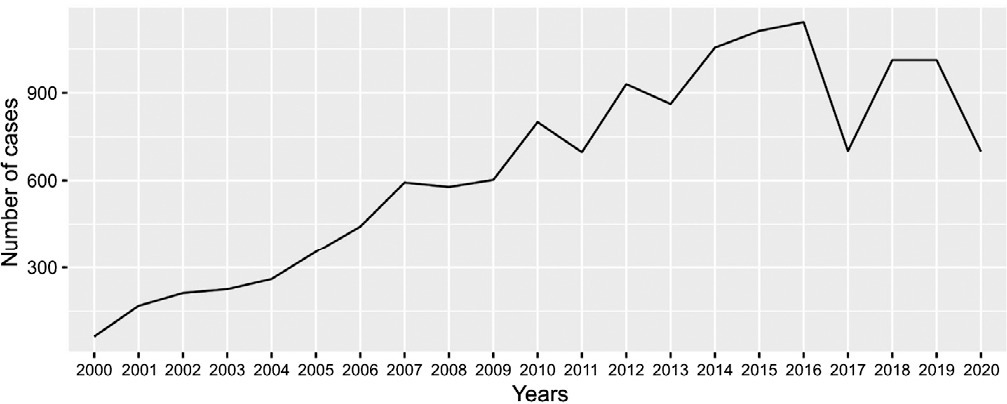
-
ORIGINAL ARTICLE07-29-2024
Disrupted mother-fetus dyad risk in high-risk pregnancies: a Middle-Range Theory
Revista Brasileira de Enfermagem. 2024;77(3):e20230464
Abstract
ORIGINAL ARTICLEDisrupted mother-fetus dyad risk in high-risk pregnancies: a Middle-Range Theory
Revista Brasileira de Enfermagem. 2024;77(3):e20230464
DOI 10.1590/0034-7167-2023-0464
Views0See moreABSTRACT
Objectives:
to develop and evaluate a Middle-Range Theory for the nursing diagnosis “Disrupted Mother-Fetus Dyad Risk” in high-risk pregnancies.
Methods:
this methodological study was conducted in two stages: theory development and evaluation. Dorothea Orem’s General Nursing Model was used as the theoretical-conceptual foundation. Evaluation was conducted using the Delphi method with seven judges, and consensus was achieved when the Content Validity Index of the evaluated items was ≥ 0.80.
Results:
the theory identified 20 elements of the nursing diagnosis “Disrupted Mother-Fetus Dyad Risk” (10 risk factors, 4 at-risk populations, and 6 associated conditions), 14 propositions, and 1 pictogram. After two rounds of evaluation, the theory was considered consistent, with consensus reached for all items, each achieving a Content Validity Index ≥ 0.80.
Conclusions:
the Middle-Range Theory included biopsychosocial factors explaining the nursing phenomenon “Disrupted Mother-Fetus Dyad Risk,” which aids in nurses’ diagnostic reasoning.
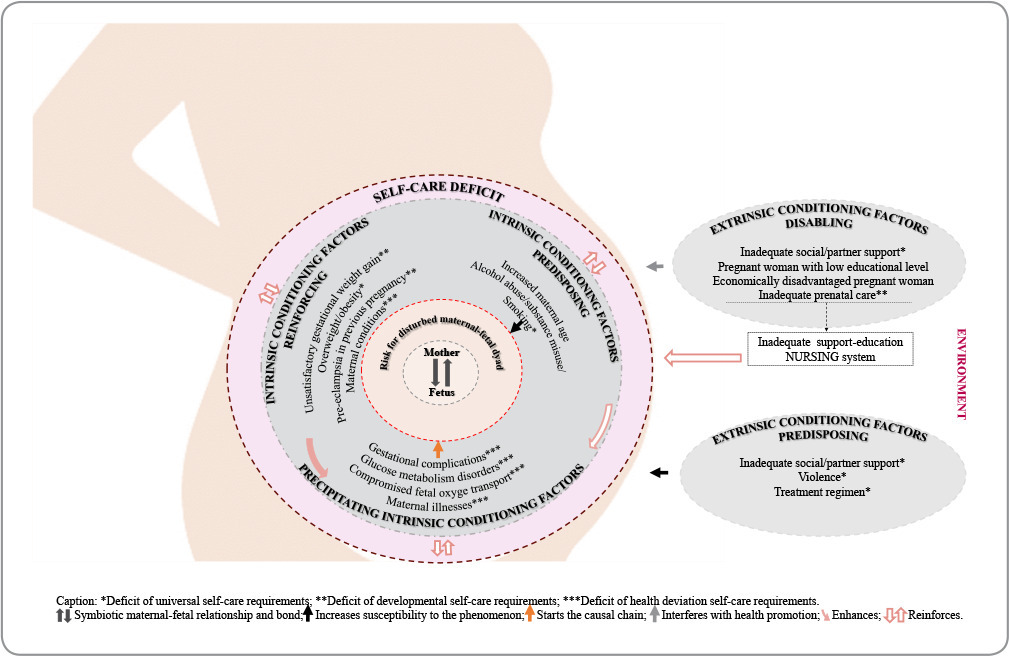
-
ORIGINAL ARTICLE07-29-2024
Mental health of parents of children and adolescents who require special health care
Revista Brasileira de Enfermagem. 2024;77(3):e20230457
Abstract
ORIGINAL ARTICLEMental health of parents of children and adolescents who require special health care
Revista Brasileira de Enfermagem. 2024;77(3):e20230457
DOI 10.1590/0034-7167-2023-0457
Views0See moreABSTRACT
Objective:
To identify the manifestations presented by parents of children and adolescents who require special health attention that can impact their mental health.
Methods:
exploratory, qualitative research, based on the concept of vulnerability, with data collection carried out through interviews with 18 parents of children and adolescents with special health care needs, hospitalized in the pediatric ward of a hospital in Paraná, between May/2017 and May/ 2018. Data analyzed by inductive thematic analysis.
Results:
parents experienced situations of vulnerability when providing care at home, with repercussions on their mental health, expressed by manifestations of lack of protection, anxiety and depression.
Final considerations:
It is important that health professionals seek to expand actions to promote care and reduce situations that generate threats, insecurities, concerns and damage to the health of parents, which can impact and further weaken care for children and adolescents who need attention especially health.
-
REVIEW07-29-2024
Profile of scientific production on nursing technology construction, validity and application: a bibliometric study
Revista Brasileira de Enfermagem. 2024;77(3):e20230452
Abstract
REVIEWProfile of scientific production on nursing technology construction, validity and application: a bibliometric study
Revista Brasileira de Enfermagem. 2024;77(3):e20230452
DOI 10.1590/0034-7167-2023-0452
Views0See moreABSTRACT
Objective:
to analyze the profile of scientific production on nursing technology construction, validity and application.
Methods:
this is a bibliometric study, carried out in six databases, based on the Methodi Ordinatio application, arranged in nine stages. To represent the findings, the VOSviewer® software was used.
Results:
346 studies were identified, obtained from BDENF, CINAHL, EMBASE, LILACS, PubMed/MEDLINE, Scopus and Web of Science. There was a predominance of the English language, and 20% of the authors hold more than 25% of studies. Only two journals account for 25% of studies in the period studied. Twenty-six studies were selected for the InOrdinatio classification. Nursing Process (23%) stood out among the studies. The most produced technology was software (27%), and 50% of works describe construction and validity.
Conclusions:
there is an emphasis on the creation of educational technologies, especially information technology. The data demonstrates opportunities for future research in the area.

-
ORIGINAL ARTICLE07-29-2024
Evaluation of software technical quality for collecting data from patients under palliative care
Revista Brasileira de Enfermagem. 2024;77(3):e20230435
Abstract
ORIGINAL ARTICLEEvaluation of software technical quality for collecting data from patients under palliative care
Revista Brasileira de Enfermagem. 2024;77(3):e20230435
DOI 10.1590/0034-7167-2023-0435
Views0See moreABSTRACT
Objectives:
to evaluate software technical quality for collecting data from patients under palliative care.
Methods:
this is methodological technology evaluation research, according to the technical standard International Organization for Standardization/International Electrotechnical Commission 25040-2011, developed from August 2021 to August 2023. Eight nurses and eight information technology professionals participated as judges, who evaluated six quality characteristics and 23 subcharacteristics. Items that reached a percentage of agreement greater than 70% were considered suitable.
Results:
the characteristics evaluated by nurses/information technology professionals received the following percentages of agreement, respectively: functional suitability (94%-84%); reliability (100-70%); usability (89.9-66.8%); performance efficiency (95.8%-86.1%); compatibility (95.8-79.6%); and safety (96%-83.4%).
Conclusions:
the software was considered suitable in quality evaluation to offer support to nurses in collecting patient data under palliative care, with the potential to operationalize the first Nursing Process stage.
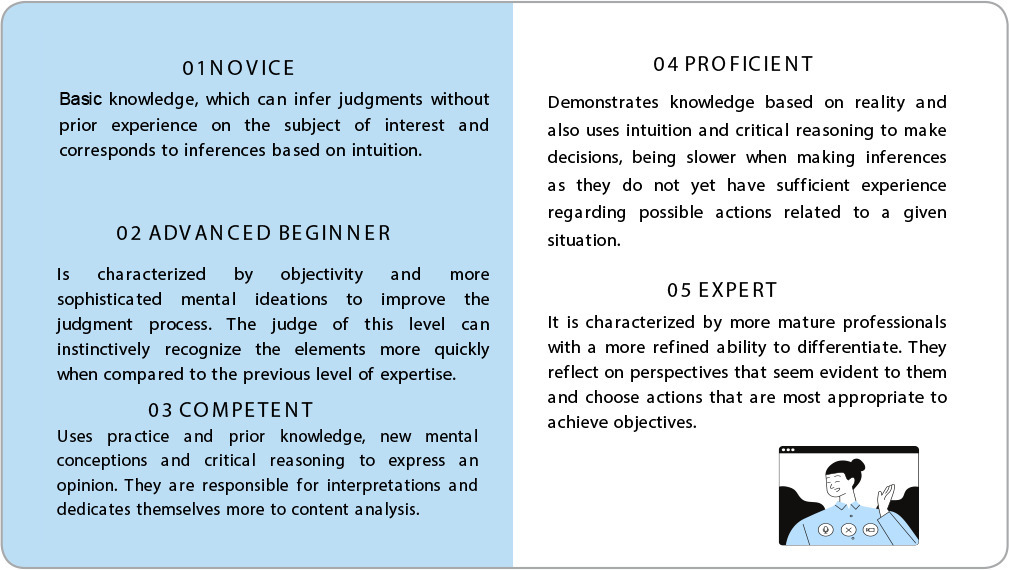
-
ORIGINAL ARTICLE07-29-2024
Sexual counseling for people with acute coronary syndrome: educational video development
Revista Brasileira de Enfermagem. 2024;77(3):e20230416
Abstract
ORIGINAL ARTICLESexual counseling for people with acute coronary syndrome: educational video development
Revista Brasileira de Enfermagem. 2024;77(3):e20230416
DOI 10.1590/0034-7167-2023-0416
Views0See moreABSTRACT
Objective:
to assess validity evidence of an educational video on safe sexual activity after acute coronary syndrome.
Method:
study in three phases: video development; content validity analysis by 11 experts; and analysis of validity based on response processes by seven people with coronary disease. The content validity ratio (CVR) was calculated with critical values for the second phase of 0.63 and for the third of 1.0.
Results:
the video addressed the importance of resuming sexual activity and positions that consume less energy, clinical warning signs, the importance of adhering to treatment and a welcoming environment for sexual practice. A CVR above the critical value was obtained with a total of 4 minutes and 41 seconds.
Conclusion:
the educational video brings together adequate content validity evidence and can be used as a tool for patients after acute coronary syndrome.
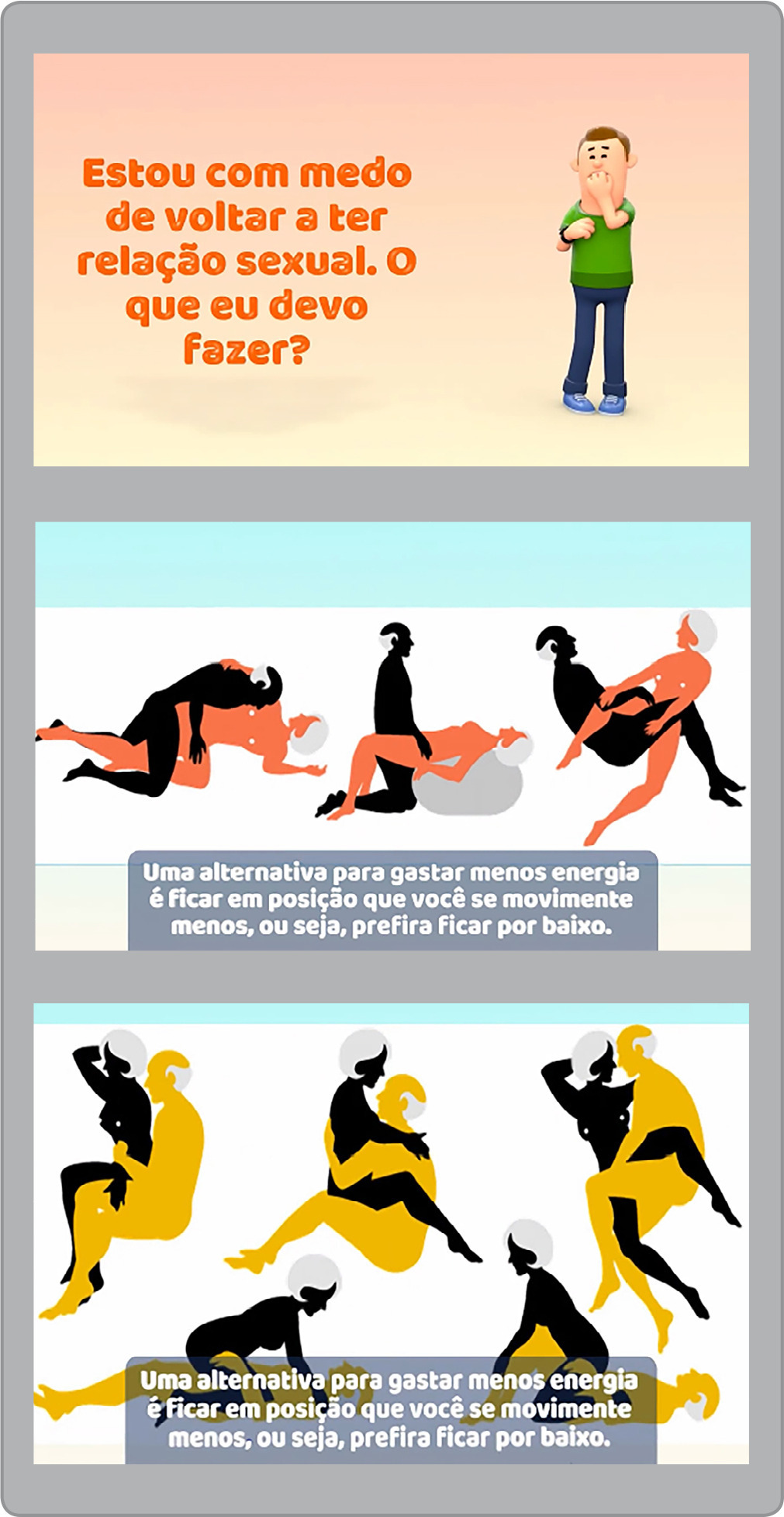
-
REVIEW07-29-2024
Utilization of local pressure devices in pain management during injections: scoping review
Revista Brasileira de Enfermagem. 2024;77(3):e20230399
Abstract
REVIEWUtilization of local pressure devices in pain management during injections: scoping review
Revista Brasileira de Enfermagem. 2024;77(3):e20230399
DOI 10.1590/0034-7167-2023-0399
Views0See moreABSTRACT
Objective:
to map scientific evidence regarding the use of local pressure devices in pain relief during injection procedures in patients.
Methods:
scoping review, following the recommendations of the JBI Manual for Evidence Synthesis and PRISMA-ScR, with searches conducted in the PubMed, EMBASE, CINAHL, LILACS, and PsycINFO databases, without temporal restrictions and with a cutoff date of March 2023.
Results:
a total of 1,514 studies were identified, with 20 articles included in the final sample. The ShotBlocker® device was utilized during subcutaneous and intramuscular injections in children and adults, proving beneficial in reducing pain, anxiety, and fear associated with the procedure.
Final considerations:
the ShotBlocker® is a low-cost, easy-to-use device that can enhance nursing clinical practice during painful procedures. However, studies involving the Brazilian Pikluc® device are scarce. Further research involving both local pressure devices is recommended.
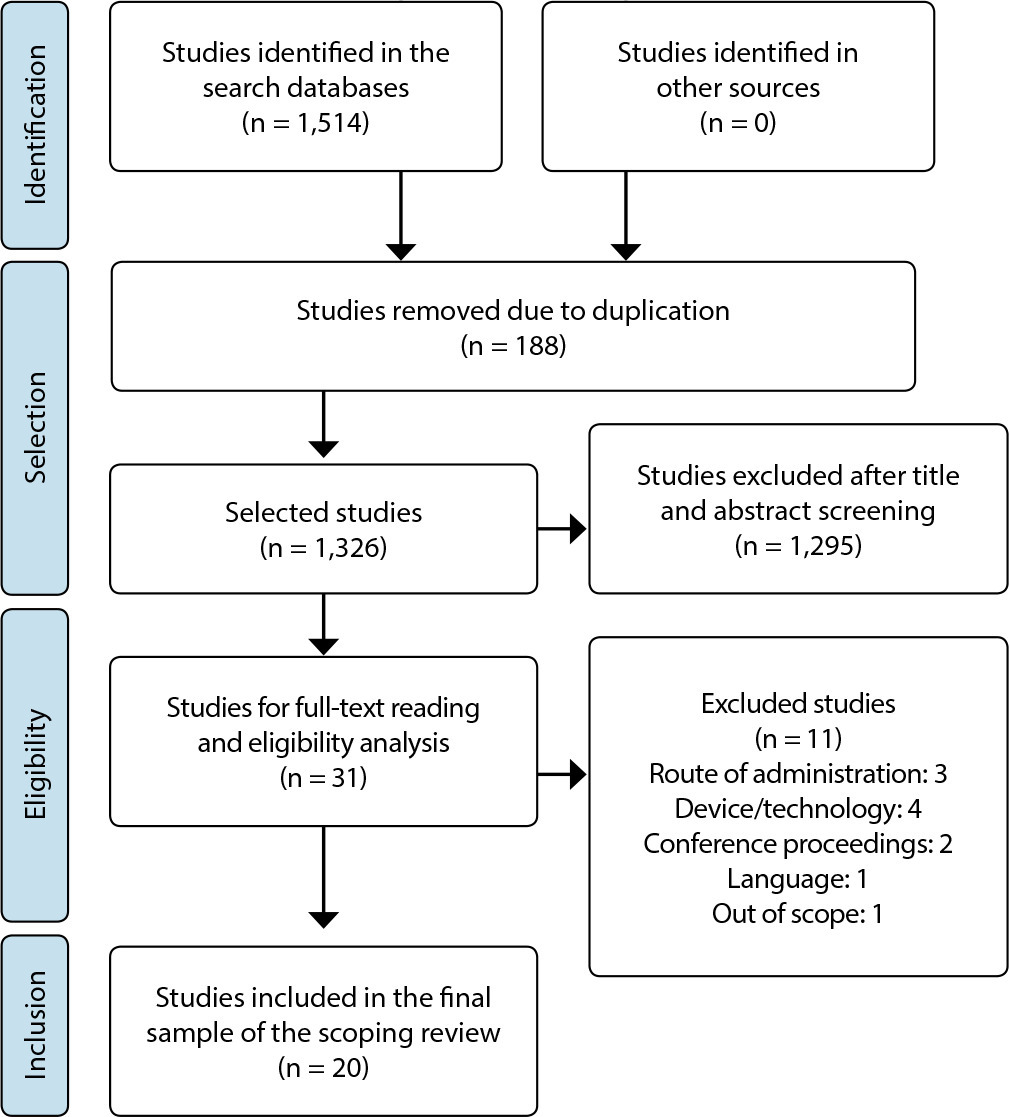
Search
Search in:
Nuvem de Tags
Adolescente (85) Atenção Primária à Saúde (239) COVID-19 (91) Criança (91) Cuidados de Enfermagem (269) Educação em Enfermagem (151) Educação em Saúde (139) Enfermagem (930) Enfermagem Pediátrica (86) Estudantes de Enfermagem (77) Estudos de Validação (131) Família (87) Idoso (208) Promoção da Saúde (99) Qualidade de Vida (104) Saúde do Trabalhador (86) Saúde Mental (145) Saúde Pública (82) Segurança do Paciente (150) Tecnologia Educacional (100)



